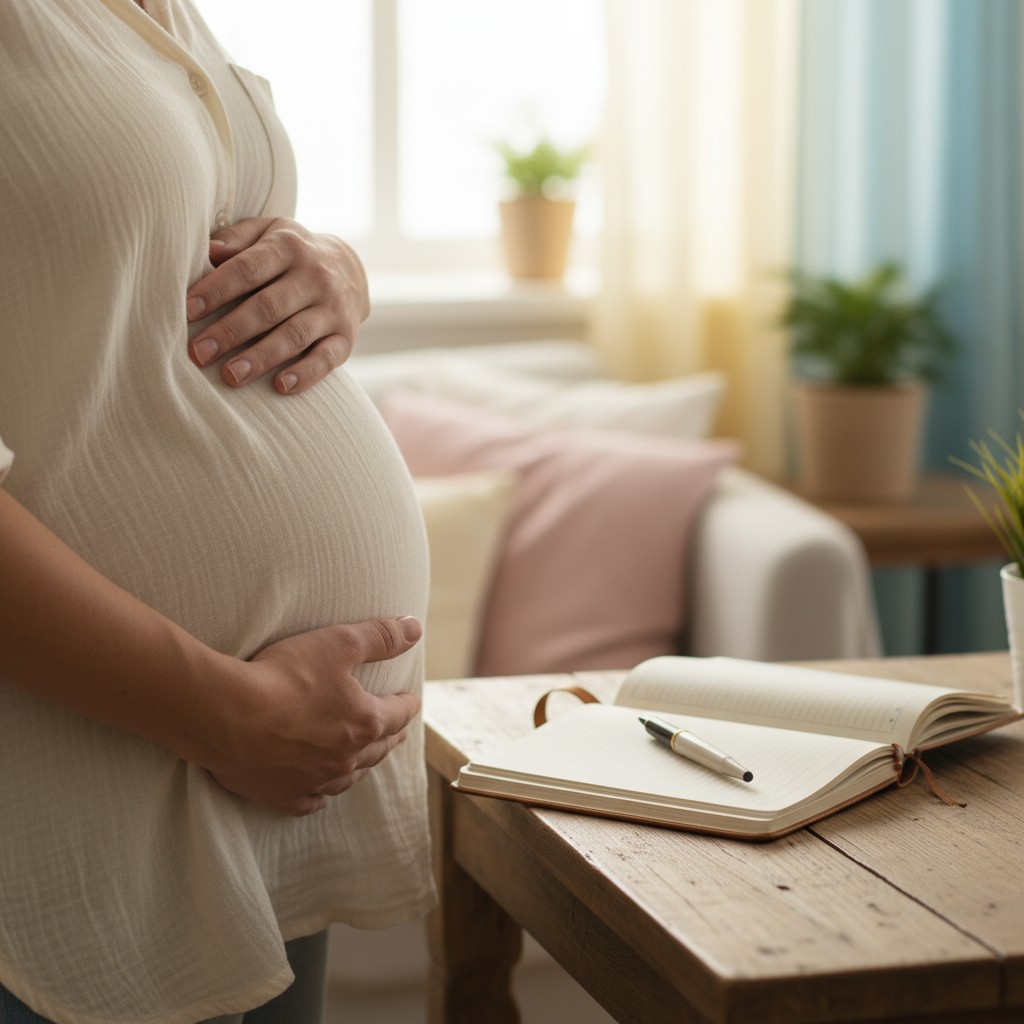
How to Stay Positive During Pregnancy Body Changes
Pregnancy transforms your body in remarkable ways as it adapts to nurture new life, yet research shows approximately 70% of women experience body image concerns during this transformative time. The second trimester often brings more visible changes that can challenge how you perceive your changing shape, requiring both acceptance and a compassionate perspective.
Key Highlights
Here are some essential strategies to maintain a positive mindset about your changing body:
- Practice body neutrality by focusing on what your body accomplishes rather than how it looks
- Develop self-compassion techniques for difficult days
- Challenge negative thoughts with cognitive reframing
- Create a supportive environment both online and offline
- Approach movement and nutrition from a self-care perspective
Understanding Body Image During Pregnancy

Body image encompasses your perceptions, feelings, and thoughts about your physical self—and pregnancy creates a unique challenge as your body changes rapidly in ways beyond your control. During the 2nd trimester, these changes become more visible, with your growing belly, expanding breasts, and other physical transformations. It’s completely normal to have mixed feelings about these changes, as your pre-pregnancy sense of self adjusts to this new reality.
Many women find themselves caught between societal expectations, personal identity, and the miracle of pregnancy. Rather than focusing solely on body positivity (loving your body), many experts now recommend exploring body neutrality and body acceptance—approaches that acknowledge your body’s value beyond appearance. These perspectives focus on appreciating what your body is accomplishing rather than how it looks, offering a more sustainable mindset during times of significant physical change.
Embracing Body Neutrality: A Practical Approach
Body neutrality offers a practical middle ground for pregnancy by shifting focus from appearance to functionality. Instead of pressuring yourself to love every change, this approach encourages you to appreciate what your body is doing—creating life, adapting its systems, and preparing for birth. This perspective can be particularly helpful when dealing with common pregnancy headaches second trimester symptoms or other discomforts.
To practice body neutrality, try these approaches:
- Recognize your body’s daily achievements (“My body is building a placenta” rather than focusing on stretch marks)
- Use neutral language when thinking about your body (“My body is changing to support my baby” instead of judgmental terms)
- Observe physical sensations without judgment during prenatal activities
- Acknowledge discomfort without attaching negative self-worth (“I feel uncomfortable, and that’s okay”)
According to research from the Body Image Research Group, women who adopt functional perspectives of their bodies report greater body satisfaction during pregnancy than those focused primarily on appearance. As your pregnancy progresses through the weeks 16-24 of the second trimester, this mindset becomes increasingly valuable.
Your Body’s Wisdom: Self-Compassion Practices

Even with a neutral mindset, challenging days will come when you might feel disconnected from or frustrated with your changing body. Self-compassion practices can provide emotional support during these moments. The 2ns trimester brings significant body changes that may trigger these feelings, making compassion particularly important.
Try these evidence-based self-compassion techniques:
- Self-Compassion Break: When feeling critical of your body, place a hand on your heart and say, “This is a moment of difficulty. Many pregnant women feel this way. May I be kind to myself right now.”
- Physical Touch: Gently rest your hands on your belly, acknowledging the connection between you and your baby to activate your parasympathetic nervous system.
- Body Gratitude Journal: Write three things your body accomplished today in service of you and your baby.
- Body Scan Meditation: Spend 5-10 minutes mindfully scanning your body from head to toe, noting sensations without judgment.
Dr. Kristin Neff, a leading self-compassion researcher, notes that self-compassion during pregnancy correlates with lower rates of prenatal depression and anxiety. Building this skill now can also help during postpartum adjustment.
Challenging Negative Body Thoughts
Our thoughts significantly influence our feelings, and pregnancy can trigger unhelpful thinking patterns about our bodies. Cognitive reframing—recognizing and challenging negative thoughts—can break this cycle. Notice when your mind turns to criticism, especially as you move further into your 2nd month pregnancy and physical changes become more apparent.
When negative body thoughts arise, try this cognitive approach:
- Identify the thought (“My body is getting huge”)
- Challenge its accuracy (“My body is growing appropriately to nurture my baby”)
- Consider what you’d say to a friend with the same concern
- Replace the negative thought with a more balanced perspective
- Focus on a specific function your body is performing right now
Research from the Journal of Obstetric, Gynecologic & Neonatal Nursing shows that pregnant women who practice cognitive restructuring report improved body satisfaction and reduced anxiety. As you experience the various relationship changes during the second trimester, these skills can also help navigate conversations about your changing body with partners and family.
Creating a Supportive Environment

Your environment significantly impacts how you feel about your body during pregnancy. Creating supportive surroundings—both online and offline—can protect your body image as you navigate these changes. This becomes especially important as your pregnancy becomes more visible to others who may offer unsolicited comments or advice.
Consider these strategies for building a supportive environment:
- Curate your social media to include body-positive pregnancy accounts and unfollow content that triggers comparison
- Prepare responses for unwelcome comments about your body (“Thank you for your interest, but I’m focusing on how my baby is growing, not my size”)
- Connect with other pregnant women who share body-positive or body-neutral perspectives
- Communicate with your partner about your feelings and how they can support you
- Seek professional support if body image concerns cause significant distress
Research published in Body Image Journal indicates that pregnant women with supportive social networks report fewer body image concerns and greater overall well-being throughout pregnancy.
Movement and Nutrition as Self-Care
Approaching physical activity and nutrition from a self-care perspective rather than for appearance can transform your relationship with your pregnant body. Safe movement during pregnancy supports your physical and mental health while honoring your body’s changing needs and limitations.
The American College of Obstetricians and Gynecologists recommends 150 minutes of moderate activity weekly for most pregnant women, with appropriate modifications as pregnancy progresses. Consider safely modifying workouts in the second trimester to accommodate your changing body while maintaining fitness.
For a healthier relationship with food and movement during pregnancy:
- Focus on how exercise makes you feel (energized, strong, relaxed) rather than how it shapes your body
- Practice intuitive eating—eating when hungry, stopping when full, and choosing foods that satisfy both nutritional needs and cravings
- View food as nourishment for both you and your baby, not as “good” or “bad”
- Adjust expectations for physical performance as pregnancy progresses
- Choose comfortable, supportive maternity workout clothes that make you feel confident
Studies show that pregnant women who view exercise as self-care rather than weight management report greater body satisfaction and mental well-being throughout their pregnancy journey.
Embracing Your Changing Body with Grace
Pregnancy body changes can challenge even the most body-confident person, but approaching this time with neutrality, compassion, and mindfulness can transform your experience. Remember that your body is doing exactly what it needs to do to nurture new life—a temporary but profound journey worthy of respect and care.
The strategies shared here—from practicing body neutrality to creating supportive environments—can help you navigate the physical transformation of pregnancy with greater ease and acceptance. On difficult days, return to self-compassion practices and remember that millions of women share similar feelings about their changing bodies. By focusing on function over form and care over criticism, you can develop a healthier relationship with your body that will serve you not just through pregnancy, but into motherhood and beyond.
Sources
- American College of Obstetricians and Gynecologists – Exercise During Pregnancy
- Dr. Kristin Neff – Self-Compassion Research
- Body Image During Pregnancy: An Evaluation of the Suitability of the Body Attitudes Questionnaire – NCBI
- Journal of Health Psychology – Pregnancy and Body Image
- Body Image Journal – Elsevier
